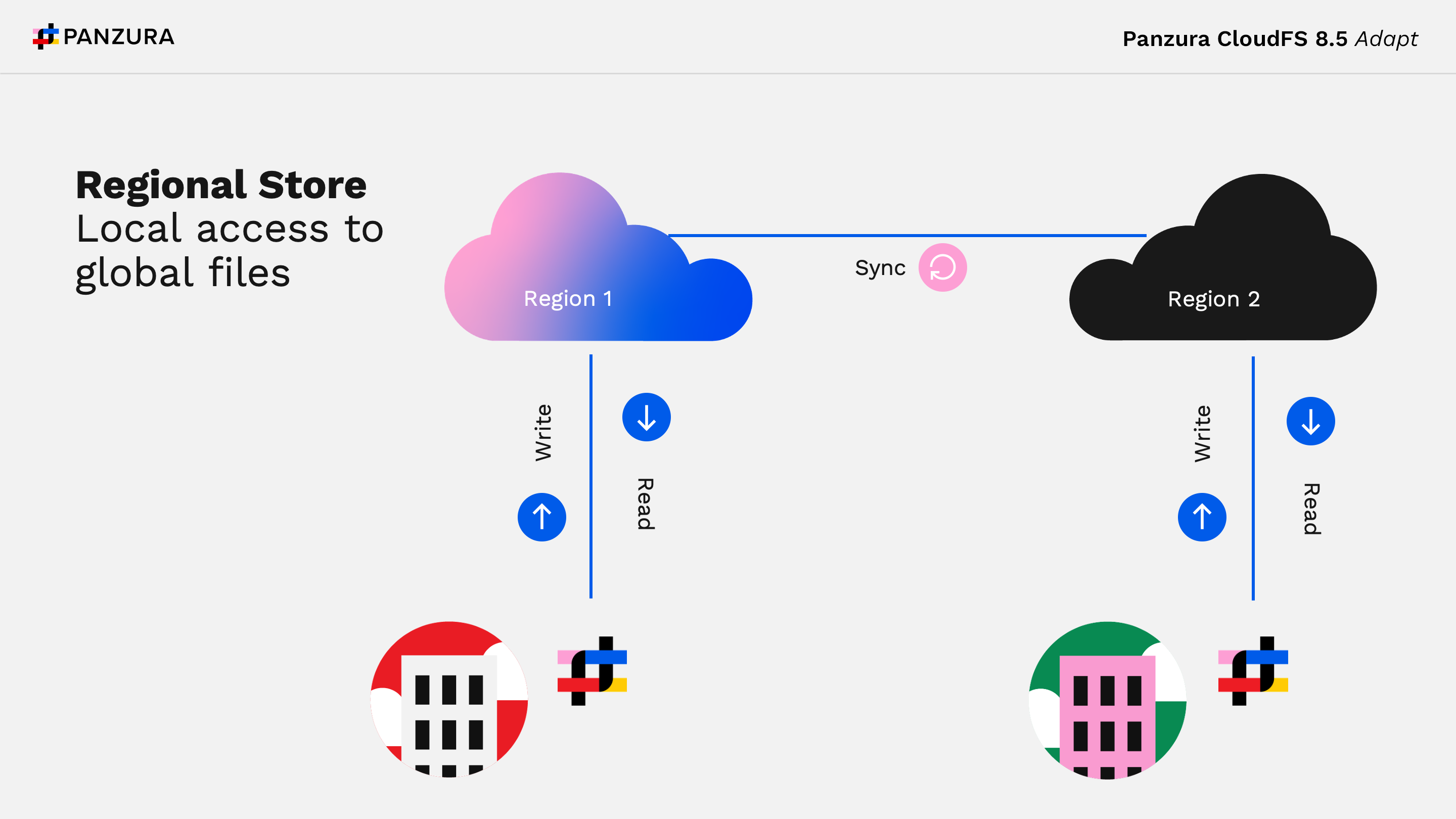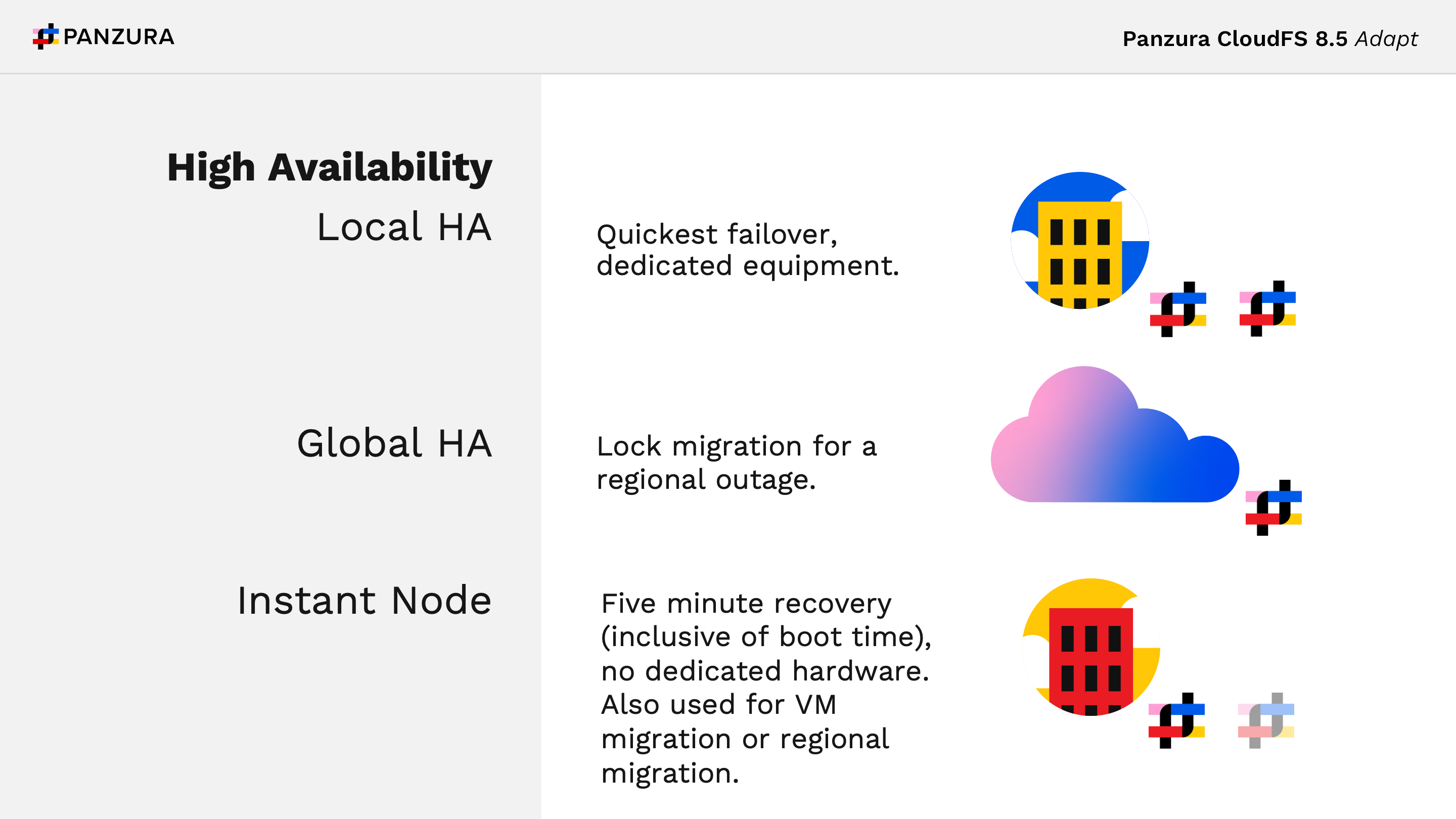New Instant Node and Regional Store Capabilities in the CloudFS Hybrid Cloud File Platform Bolster Business Continuity, Performance, and Security
Modern business is characterized by constant disruption – a state of “permacrisis” as some experts now call it. In this environment, resilience is no longer a luxury but a necessity.
The latest release of the Panzura CloudFS hybrid cloud file platform, CloudFS 8.5 Adapt, tackles this challenge head on. It offers advancements in business continuity, performance, and security for organizations grappling with increasing data demands.
The CloudFS platform provides local-feeling file services that allow centralized cloud storage to behave as if it is in a high-performance data center. CloudFS 8.5 Adapt introduces several new capabilities including Instant Node and Regional Store. They enable uninterrupted business operations where disruptive events like natural disasters, cyberattacks, power outages, or hardware failures are an unpredictable reality.

According to Panzura, the company is innovating faster than its competitors. While similar systems provide basic file synchronization and limited disaster recovery, CloudFS 8.5 Adapt goes further.
Instant Node provides near-instant recovery of a downed CloudFS node without the need for dedicated high-availability (HA) hardware, which is a capability not available elsewhere. Regional Store offers an approach to optimizing performance for distributed teams by creating localized object stores as part of a single global file system, minimizing latency and egress fees.
The CloudFS platform offers a global file services experience with consistent metadata management across all locations which sets it apart, according to Panzura. Panzura says the platform provides a seamless and collaborative experience for geographically dispersed teams that other solutions do not match.
Enterprise-class Business Continuity and Redundancy
CloudFS nodes – localized virtual environments – enable file operations by caching active files. Real-time awareness of metadata across the entire system, irrespective of the number of locations or distance between them, eliminates ‘collisions’ when working with files. The new Instant Node capability lets IT teams replace failed nodes or move an on-premises node into the cloud. That means they can avoid downtime and get back up-and-running in minutes.
Downtime can cripple businesses, especially for design, engineering, construction, and manufacturing firms. Symetri, a Panzura partner, provides these firms with expertise, technology and services. Symetri ensures they have access to the technological solutions they need to improve their performance and sustainability.
“Downtime can halt projects, impacting deadlines and budgets,” said Bradley C. Horst, Vice President of CIO Advisory Services at Symetri.
Instant Node allows Symetri clients to rapidly restore file access after disruptions, whether it’s a hardware failure, a cyberattack, or even a simple planned migration. “This minimizes project delays and ensures teams can continue working, protecting our clients from costly disruptions which are often unpredictable. It’s particularly crucial for large file sizes common in these industries,” Horst said.
Panzura Chief Technology Officer Sundar Kanthadai elaborates, “Instant Node delivers persistent business operations and continuity. It provides the ability to deploy, migrate, restore, or rebuild any node with unprecedented speed and ease.”
The Instant Node is a contrast to traditional active or passive high availability, which requires dedicated hardware for failover. Panzura points out that this speed is beneficial for organizations migrating away from VMware, streamlining the transition to a cloud-based file services architecture. A new CloudFS node can be brought up in under five minutes.
Beyond disaster recovery, Instant Node also facilitates hardware upgrades, planned migrations, and other IT initiatives. Horst said this flexibility makes it easier to upgrade and modernize hybrid cloud and on-premises architectures without disrupting ongoing operations.
Instant Node has cost benefits. Traditional HA infrastructure often involves significant investment in expensive redundant hardware and ongoing maintenance. Instant Node provides a more cost-effective and agile approach, according to Horst.
“It leverages existing resources like servers or VMs, allowing any organization – large or small – to achieve high availability without the hefty price tag. This democratizes access to robust business continuity solutions and frees up IT resources for other strategic initiatives,” he said.
Instant Node takes resilience a step further with a REST application programming interface or API, allowing integration with existing IT infrastructure and automation tools. “The REST API allows our clients to automate recovery workflows, integrate with third-party orchestration solutions, and streamline IT operations,” Horst said.
According to Horst, IT teams could integrate Instant Node with their monitoring system to trigger automated failover in case of a server issue, minimizing manual intervention and recovery time. “We see integrations with monitoring and orchestration tools as particularly valuable, as they enable proactive and automated responses to potential issues.”
Optimizing Performance for Geographically Dispersed Teams
With the emergence of hybrid and remote workforces, companies have dispersed teams that need access to shared files and data. Latency can cause delays for people and processes located a significant distance from the primary data store. Panzura says that for data not yet cached by CloudFS, shortening the distance between users and the data they need accelerates performance.
CloudFS 8.5 Adapt addresses this challenge with a new Regional Store capability. Horst said his clients often work on projects together, but they can be spread across different offices or even countries. Regional Store brings the data closer to these teams, according to Horst, reducing latency and improving access speeds for large design files and building information modeling (BIM) applications.
“This eliminates frustrating delays, improves collaboration, and allows teams to work efficiently regardless of location. For instance, structural engineers in one location and contractors on a construction site working on the same Revit model can all access and modify the model in real time with CloudFS, without experiencing latency or version control issues, and reducing rework,” he explains.
Regional Store allows IT teams to create localized object stores, reducing the distance data needs to travel. “Bringing the cloud closer to people and processes significantly enhances operational performance for outlying teams, slashes data transfer fees, and reduces total cost of ownership. That translates into fewer support tickets and more focus on strategic initiatives,” commented Kanthadai.
Horst said Regional Store also offers cost savings for Symetri clients dealing with large datasets and frequently accessed files. “Besides boosting productivity, Regional Store minimizes cloud egress fees. Storing data closer to users reduces the amount of data that needs to be transferred across regions, which translates directly into lower cloud costs,” Horst said.
CloudFS 8.5 Adapt isn’t just about addressing current challenges, according to Panzura. The company says it is also about preparing businesses for the coming wave of AI workloads, data fabrics, and composable tooling with flexible and adaptable unstructured file services.
Horst adds, “Its focus on data resilience, control, and immediate data delivery lays the foundation for integrating AI and other advanced technologies. This allows our clients to leverage these technologies without being hampered by data access bottlenecks.”
He said CloudFS 8.5 Adapt enables Symetri clients to be more resilient, efficient, and competitive. “It empowers them to focus on innovation and growth, rather than being bogged down by IT complexities. We see it as a key enabler for digital transformation in data-driven industries with complex workflow and uptime requirements.”
Beyond its headline features, CloudFS 8.5 Adapt also delivers enhancements to security and operations. The platform now has expanded Role-Based Access Control (RBAC) with sophisticated Single Sign-On (SSO) capabilities, integrated with OKTA. This centralized identity management approach tightens security and user access.
For organizations leveraging Microsoft Azure, CloudFS 8.5 Adapt offers Storage Tier Support, providing greater flexibility and cost control. According to Panzura, this allows them to align their storage strategy with performance and budget requirements. This Azure integration complements existing AWS support.



































